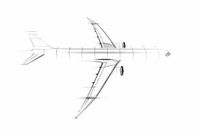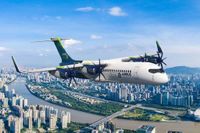During the third edition of the Airbus Summit in Toulouse, held on March 24 and 25, 2025, the aerospace giant reaffirmed its commitment to tackling decarbonization and promoting a sustainable industry. A formidable part of that commitment includes the ongoing development of hydrogen aircraft and the use of sustainable aviation fuels (SAF), themes central to discussions headed by CEO Guillaume Faury.
At the summit, Faury addressed concerns surrounding the ambitious hydrogen plane project, stating that while progress has been made, developments have been slower than expected. "On March 7, 2025, Airbus announced that the necessary advancements in this hydrogen project are proving more difficult than initially anticipated," he explained. However, on March 25, he firmly reassured attendees: "We continue to believe in hydrogen for the same reasons that brought us to launch this project five years ago. It is the only viable way for aviation to use a fuel that will not emit any carbon into the atmosphere," marking a strong reaffirmation of Airbus's ongoing belief in sustainable fuel sources.
Despite progress on the hydrogen front, Faury warned that the technology is not yet competitive with traditional aircraft. "We have gained assurance that we can build a working hydrogen aircraft, but its competitiveness relative to conventional planes is still lacking. Furthermore, the green hydrogen ecosystem—everything from hydrogen fuel distribution at airports to pricing—has yet to be established completely," he noted. His remarks highlight an urgent need for infrastructure supportive of a hydrogen economy.
Furthermore, the Airbus CEO underscored that this commitment to hydrogen does not lead to the revamping of the company’s entire sustainability roadmap, even amid changing political landscapes such as Donald Trump’s return to the White House with his fossil fuel-centric agenda encapsulated by the slogan "Drill, baby, drill." Faury stated clearly, "We are not revising our roadmaps at all." He argues that a plane that consumes less fuel is inherently more efficient, competitive, and contributes to decarbonization. Therefore, the pursuit for lower fuel consumption aligns both economic viability and environmental responsibility.
However, the more immediate challenge Airbus faces is the high cost of SAF. As highlighted at the summit, to meet the goal of net-zero emissions in air transport by 2050, Airbus is pushing for a significant scale-up in SAF production. During discussions with attendees, Faury remarked, "The challenging element concerning SAF is the price. When the right scale is achieved, prices will fall." Currently, due to limited production capabilities, biocarburants remain three to five times more expensive than traditional kerosene—which presents a formidable barrier to widespread adoption.
Faury, together with aviator Bertrand Piccard, emphasized the necessity for governments to more actively engage in the SAF transition. This urgency resonates amid Europe’s regulations mandating that airlines utilize specific volumes of SAF, which can be pricier than kerosene, imposing challenges for airlines while still encouraging environmental initiatives. At the same time, the implications of U.S. policies, particularly under the leadership of pro-fossil fuel proponents like Trump, could pose obstacles to global efforts for sustainable aviation.
Moreover, at the summit, Airbus revealed potential architectural designs for the successor to the A320, with expectations set for service entry in the latter half of the next decade (2035+). The single-aisle segment, accounting for nearly 80% of air transport demand over the next 20 years, presents an enormous opportunity for Airbus as it considers new technologies that increase efficiency. However, the timeline for the hydrogen aircraft project, dubbed ZEROe, has also been postponed, now projected to enter service not before 2040 due to delays in regulatory frameworks and green hydrogen production capabilities.
Airbus is also delving into hybrid-electric technologies aimed at augmenting fuel efficiency. Forecasts suggest a 5% reduction in fuel consumption from the successor aircraft leveraging this technology. Additionally, it is exploring using composite materials and enhancing aerodynamic designs with longer, thinner wings designed to optimize drag performance.
Testing of the CFM Rise engine, a geared turbofan engine that could yield approximately 20% fuel savings, is set to be flight-tested on an A380 experimental aircraft before the decade’s end. The initial performance of this engine has been extremely promising, validating Airbus's efforts toward more efficient flight through advanced propulsor technology.
As part of this evolution, Airbus must grapple with producing sustainable aviation solutions at scale. The tight timeframe for developing these aircraft is compounded by the urgency to increase the share of SAF in the aviation fuel mix, which currently makes up less than 1%. The company acknowledges the obstacles ahead as they navigate production bottlenecks and regulatory timelines, maintaining hope that challenges will yield paths toward significant advancements.
Guillaume Faury concluded: "I have the conviction that hydrogen has a future role to play as an energy source. In five years, we have learned tremendously and know now that we can build a hydrogen plane that works." Faury’s optimism remains unwavering regarding the hydrogen aircraft’s potential to serve the regional market, despite the increasing pressure from competing energy agendas. He concluded that they don’t want to "be right too early in a scenario where the economics pinch a project that could change the aviation landscape." The messaging is clear: as Airbus continues to evolve, it remains committed to balancing innovation with market realities and regulatory opportunities towards a sustainable future in aviation.






